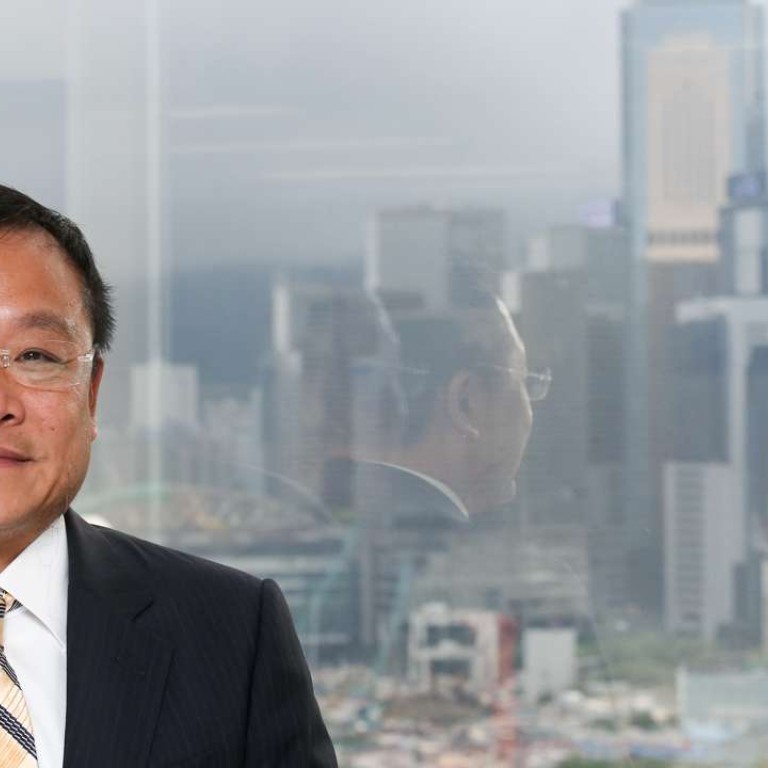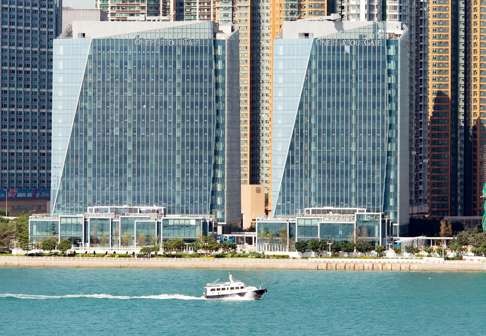
Buy a home that’s ‘unique and scarce’, says Savills chief
Raymond Lee also explains the thinking behind China Life’s decision to buy the West Tower at One HarbourGate
Raymond Lee Wai-man, chief executive of Savills greater China, is responsible for the overall operations and business expansion of the international property consultant in the area.
He is a member of the company’s Asia board and was appointed to its group executive board, which is responsible for formulating strategies for Savills Group globally.
Lee joined the firm in 1989 and was directly responsible for major sole-sales agency projects, providing both marketing and consultancy advice.
Under his leadership, the investment department has become a dominant player in recent years in Hong Kong, with sales worth HK$12.4 billion in 2014 and over HK$20 billion last year.
Savills also leads the field in major transactions of at least HK$1 billion, with more than a 60 per cent share in the first half of 2016.
Major deals include the sale of Ho Tung Garden on the Peak for HK$5.1 billion and the sale of One HarbourGate (OHG) (West and East Towers) worth a total consideration of HK$10.35 billion.
Both those deals broke records for private residential sales transactions in Hong Kong and en-bloc office tower purchases in Kowloon respectively.
Savills’ investment department works for mortgagees, receivers and the courts, as well as private owners, developers and investors. Its property disposal services include private treaty sales, tenders (public or private) and public auctions.
Lee graduated from Hong Kong Polytechnic University with a degree in Business Studies.
What are the challenges for mainland enterprises looking for a headquarters building in Hong Kong?
I have visited different cities – including Guangzhou, Shanghai, Beijing and Chengdu – to meet top managements at state-owned and privately owned enterprises wanting to set up HQs in Hong Kong. Working with state-owned enterprises is time consuming as they have to seek approvals from the State-Owned Assets Supervision and Administration Commission (SASAC).
For instance, it took China Life Insurance (Overseas), a wholly owned subsidiary of the mainland largest financial insurer China Life Insurance (Group), more than a year to sign an agreement to acquire the HK$5.85 billion West Tower of One HarbourGate in Hung Hom in November last year.
Most mainland firms prefer to buy office buildings in Hong Kong’s core business areas such as Central or Wan Chai. Why did China Life Insurance choose a new building in Hung Hom, Kowloon for its HK headquarters?
China Life had visited these two buildings, but what they wanted was a top-notch office building with world-class design. In addition, office space in Kowloon was 50 per cent cheaper than on Hong Kong Island.
Investment yield is also a top consideration for insurance companies when they buy property for their own use and for investment. China Life’s West Tower of One HarbourGate will fetch a yield of four per cent per annum, compared with two per cent on Hong Kong Island.

Originally, it planned to buy two office blocks, the East and West Towers at One HarbourGate, for just over HK$10 billion – one for the group’s own use and the other for investment purpose.
But then the group’s investment department decided properties outside of Hong Kong in the mainland could provide more attractive investment returns, and dropped the purchases in late 2015. However, when its senior management changed early this year, we took the opportunity to submit our proposal again, and this time they decided to buy the West Tower, which would act as the headquarters of China Life Insurance (Overseas), which has expanded rapidly in recent years.
What is your forecast for the Hong Kong property market, as both the HK and mainland economies slow?
The residential and office markets will face challenges in view of increases in supply in coming years.
The government has projected there will be a potential supply of 93,000 new flat over the next three to four years. Stretch that to five years, and the annual supply will be 18,600 new flats, 5,000 more than the average supply of 13,700 flats per year over the past decade.
Developers have already come up with an array of incentives and financial assistance to encourage more home buying.
The government has indicated there will be weakened demand in the mass-housing market compared with several years ago, while the supply of ultra-luxury flats, each worth more than HK$500 million, on The Peak will also climb to a new high as well.
Currently, there are more than 200 units under construction or unsold in Hong Kong, with the overall average number of eight to 10 transactions for such houses, per year. It will take 20 years to absorb that supply.
New office supply will increase to 2-3 million square feet per year over the next three years, mainly focused in Kowloon East, but the annual absorption was just 1.5 million sq ft.
Having said that, I am still optimistic on Hong Kong’s market prospects.
Ten years from now, the city’s population could increase to 10 million, many coming from the mainland, as part of the Chinese government’s policy to support the Hong Kong economy.
Is it the right time to buy flats as prices have started to increase after falling more than 10 per cent from the peak in September last year?
I made my first home purchase more than a decade ago, amid an economy hurt when the IT bubble burst. I bought a 3,000 square feet apartment in Happy Valley for HK$15 million, or HK$5,000 per sq ft.
Then, the overall investment cost for such a project was HK$6,000 per sq ft inclusive of land and construction costs. The developer sold it for HK$5,000 per sq ft and it came with two car parking spaces. I took it and it is now worth nearly HK$100 million.
In early 2008, I made my second purchase, buying a 5,000 sq ft house in Sha Tin, which was even cheaper than a apartment in the area.
For your own use, you have to buy something unique and scarce. Of course, the purchase must be within your financial ability to avoid any risk of over borrowing.

